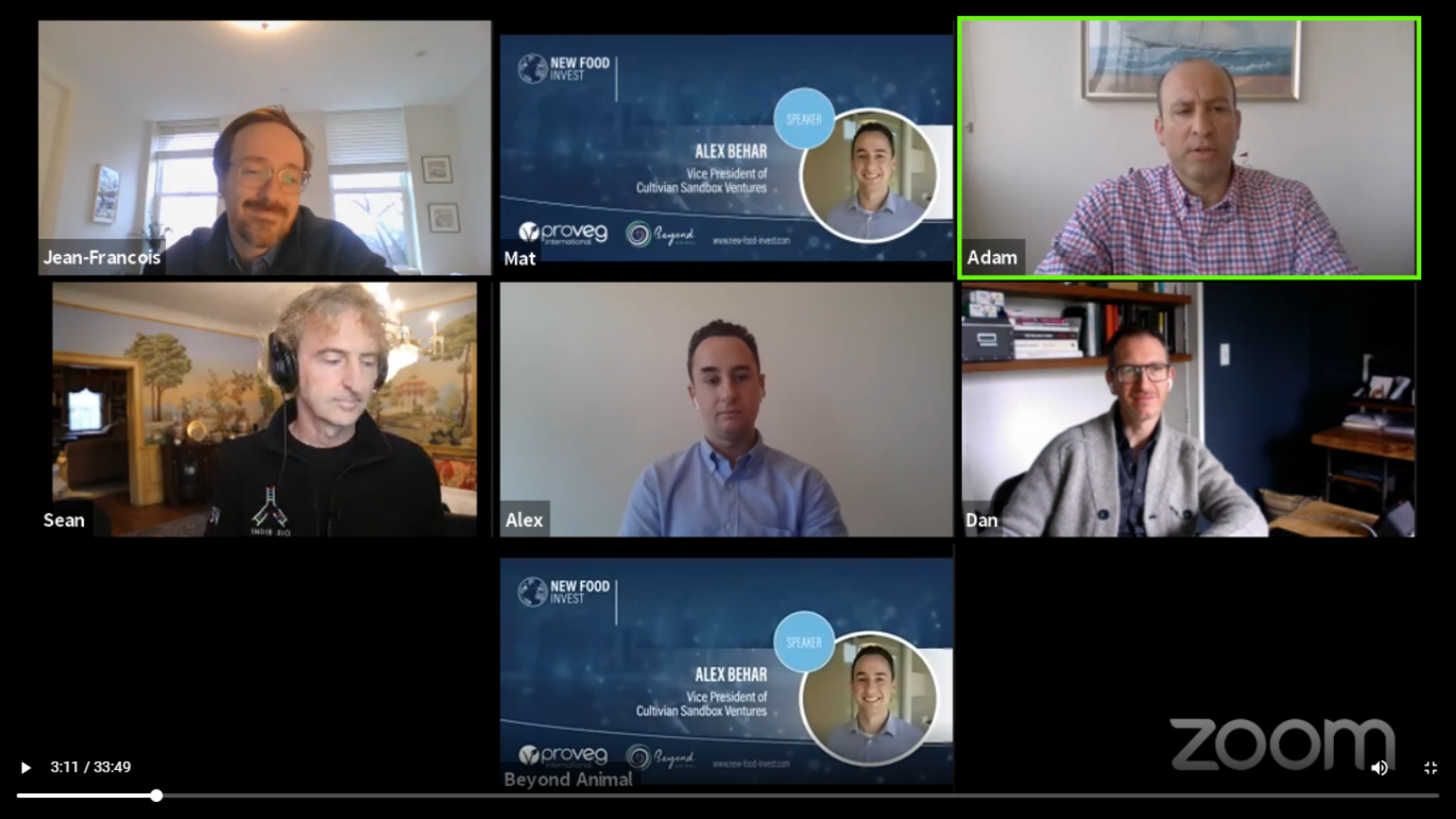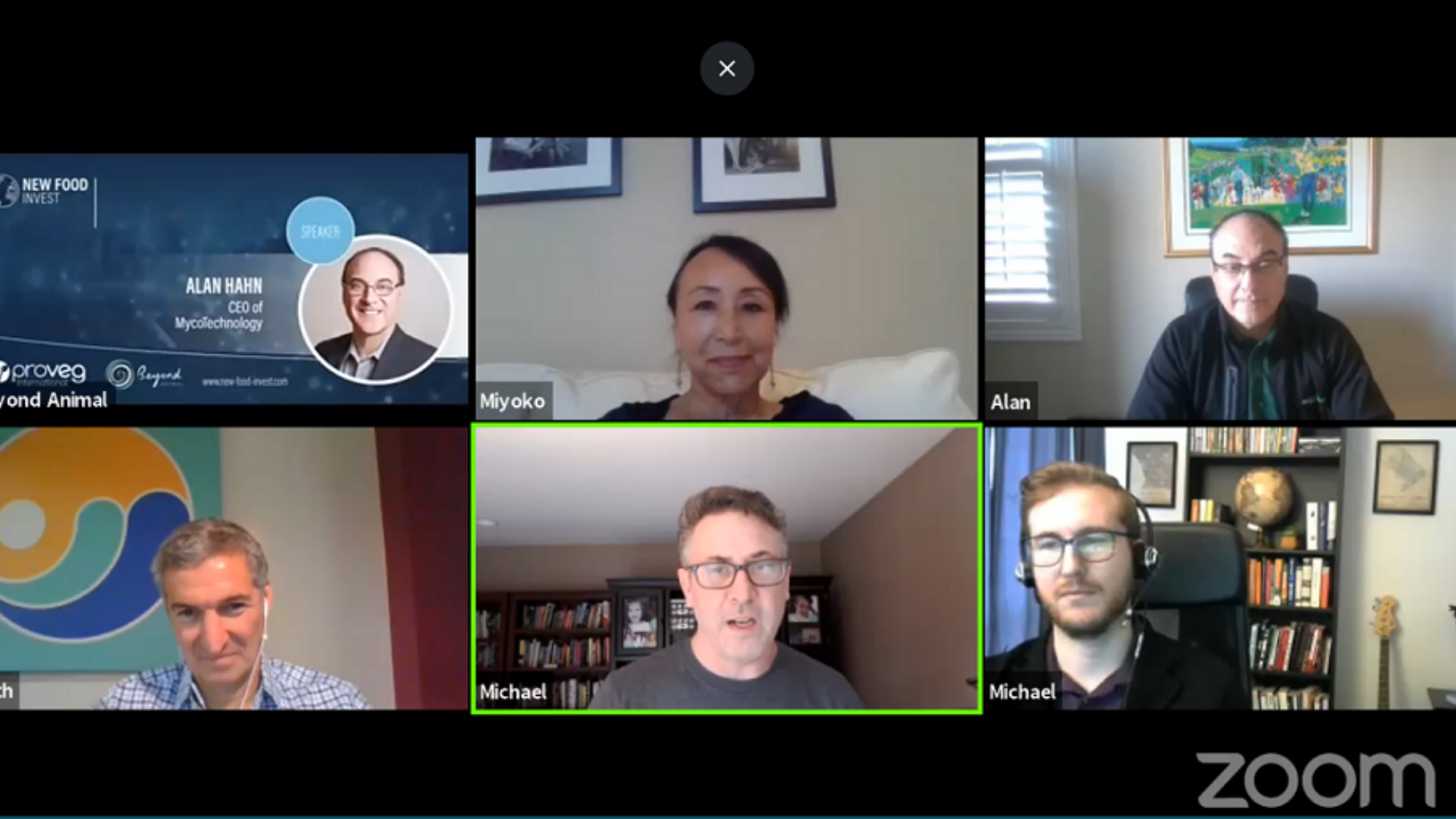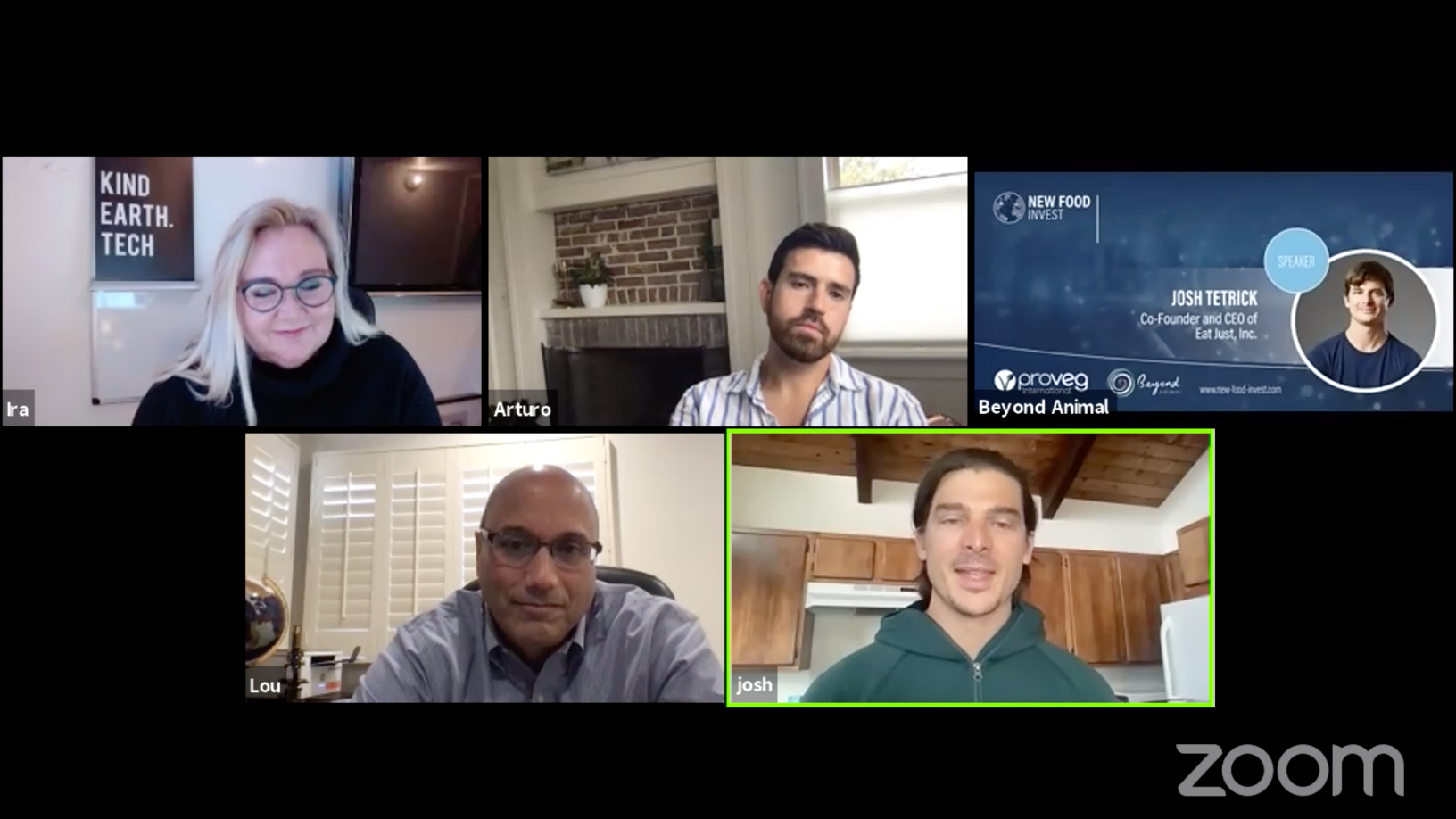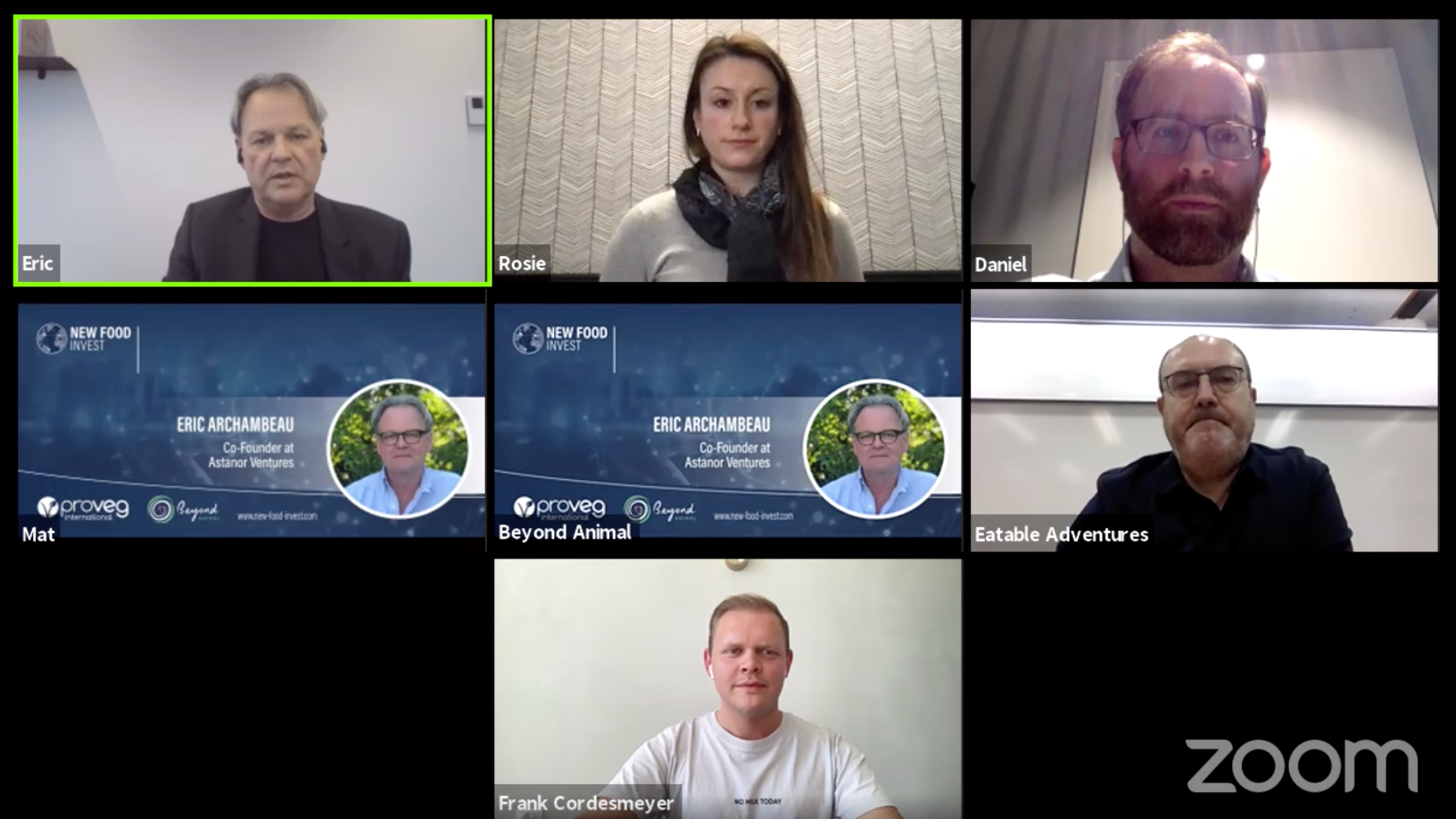Despite the global pandemic, investors have pumped over $3bn into alternative protein food companies in 2020. In November 2020, sustainable plant-based food SPAC Natural Order Acquisition raised $230m at an IPO for investments in the meat analog sector.
With equity funding worth $30bn raised so far in the first quarter of 2021, including $17.5bn from IPOs, another bumper year is expected for new foodtech in 2021, said the managing director of Morgan Stanley Pedro Costa, a keynote speaker at the recent New Food Invest conference organized by ProVeg and Beyond Meat.
As part of the March 18 virtual conference, five industry experts shared views about the sustainability of the alt-protein boom trend during a panel discussion titled, “Expert insights on the alternative protein opportunity in the Americas.” They also gave insights about what lies ahead for plant-based food including new investment opportunities. The oft-ignored plant-based cheese segment, for example, is expected to fuel the next foodtech boom.The panel discussion was moderated by Adam Bergman, foodtech expert and MD of EcoTech Capital, a boutique investor in carbon-neutral tech that had invested over $12bn during his tenure.
The panel comprised: Dan Altschuler Malek, Managing Partner at Unovis Asset Management and New Crop Capital, a global investment firm and VC fund respectively with 40 plant-based and cultured-meat alternatives including Beyond Meat; Sean O’Sullivan, founder and managing partner of SOSV, a global accelerator-based VC managing assets worth over $855m; Alex Behar, VP at Chicago-based agtech and foodtech investor Cultivian Sandbox Ventures with asset portfolio valued at over $280bn; and Jean-Francois Hurel, the chief information officer of Danone Manifesto Ventures, which invests in sustainable foodtech, the first CVC to be a Certified B Corporation, the international gold standard for social and environmental performance.
Below is an extract from the panel discussion, edited for length and clarity.
Bergman: Cultivian Sandbox has been one of the leading agtech investors for the past two decades. Why is the firm broadening its investment strategy into foodtech, including alternative protein?
Behar: We think about investments in terms of sustainable production, equitable distribution and healthy consumption. What that means is, we're still looking very much at the typical agtech type investment opportunities, but we're also investing, call it midstream, into supply chain technology. We've seen a lot in terms of food safety, food traceability, waste management, but then also critically into food ingredients, where obviously, alternative proteins fit in.
We highlighted these criteria when leading the Series A round of Geltor biodesign company. We'll look to do more of those and also consumer-facing businesses; here, we feel there's a lot of insight you can get from what consumers are actually looking for and how they're making buying decisions. We noticed that there can be a big difference between what consumers say they want and what they act on. Having a lens into that can actually make us better investors, even in agtech, and inform what kinds of technologies we need upstream to deliver what the end-consumer of food actually wants.
Dan, as one of the earliest investors in the alternative protein sector; what do you think is driving their rapid adoption, and how has investing in the sector changed over the past couple of years?
Altschuler Malek: I think a mix of different things around the world is driving [their rapid adoption]. There is global awareness of some of the many challenges of the global food supply, thanks in no small part to social media and Netflix documentaries. And those challenges are everything from the relationship between food and our health, as well as the relationship between how food is produced and its effects on the environment.
Then there is animal welfare. I think people eat a hamburger, in spite of how an animal is killed, and not because an animal is killed. As people become more aware of the challenges that the animal agriculture industry has brought about, people are increasingly thinking that they may not want that in their body. At the same time, people are hungry, so how do we join those two?
I think the key is being able to provide something that tastes great, that is within the price points that consumers can pay, and that can be presented, cooked and consumed in a familiar way. So the more seamlessly you do it, the easier it is for adoption and that is what we are trying to do across the board, from fish to cheese, to yogurts. In terms of how investing has changed, there is a lot more attention paid to the category, with more money across the different levels of investment. We also now have the attention of the large corporates, such as Danone, saying: “This is part of the future and let's be part of it”.
Alternative meat seems to be the area that people talk the most about, but alternative dairy is way ahead in terms of market adoption and market share. I'd like to get your thoughts on what you see happening in that sector. We hear it's about 13% of revenues of the full dairy sector and over 30% in some demographics; do you see this trend continuing? Could you see alternative dairy getting a majority market share? And if so, what kind of timescale?
Hurel: I don't think your point on less noise about dairy alternatives is completely true and you mentioned that the Oatly IPO is coming. But if you think about the big dairy players over the last five years, I think there has been a lot of action to make plant-based part of their investment portfolio. For example, four years ago, before Beyond Meat and Impossible Foods, Danon acquired WhiteWave which had three brands leading the dairy alternative category. And I think we're not the only one, all dairy players are progressively starting to integrate in that strategy through acquisition or a venture fund like us, but also extending their own portfolios with a 10-day option.
I also think it's different because there was a long, long way to get to something that was close to animal protein, and when people started to get closer, there was a lot of noise. Plant-based milk has been around for a while. And that's why we're already at 15% of the milk and dairy category in the US and growing at 20%. How big can it be? At Danone, we believe this category can go up to 20–25% in the next five years but at the same time, it will be really linked to innovation.
Don't forget too that, in the dairy category, you also have a lot of other sub-categories that are as big or bigger than milk. For example, yogurt and creamer are big in the US; combined together, worth $15bn, or 5% of the segment, and it's growing even faster because the maturity is lower. Another, which is even bigger, and even less mature today is cheese. Plant-based cheese is, I would say, 1% of the whole dairy category and it's growing at 50%. The reason behind cheese being less advanced and still being a huge, huge growth avenue for all the food and beverage players in the world is because it was more difficult, a bit like meat, to be able to get closer to the animal protein product. But now with the money, with the focus, with all these new brands coming in, we're getting closer and closer. And I think the future is very exciting on that side.
Plant-based cheese is, I would say, 1% of the whole dairy category and it's growing at 50%
You've been a successful tech entrepreneur and investor, Sean. What similarities and differences do you see investing in the alternative protein sector compared to other tech and biotech sectors that SOSV also looks at?
O’Sullivan: Well, for one thing, everybody has to eat and so everybody has something to say about food. Besides its universal appeal, SOSV is focused on planetary health and human health as our two categories. And food is an area where these are intersected, and within alternative protein, we see three categories: plant-based meat or plant-based alternatives; protein farming using specialized proteins like what Geltor does, or what Perfect Day does in creating flora-made proteins for making ice cream and cheeses; then there is cell-based agriculture or cultured meat.
Those three separate areas have three different timelines. As to when those will dominate, I believe that in all cases, all these things will become dominant. They will have to become non-animal-based because of our planet’s population that we have to support and the expectations that people have for the quality of their food. The best way you can get the highest quality food is going to be using cellular agriculture and plant-based meat, also the most affordable and the least-damaging for our planet. If we're going to make global warming issues go away, then we have to address the food supply, period. And that will improve our health as well.
What are the technologies being developed today that will get us to this point in the future?
O’Sullivan: Already, we have a clear pathway to where milk is four times cheaper when it's grown in a protein farming-style way rather than using animals, with the environmental effects. With improvements in technology with bioreactors, this is only going to get better. So we have a pathway to get there, but we're not there yet. I see plant-based alternatives being able to drive great financial returns for the next 20 years. But beyond that, there's going to be even more rapidly accelerating progress being made in cellular agriculture and protein farming.
I think we are talking about maybe 10% of the market always looking to have an animal-based product for their meat or for their milk. But I do believe that it will be a luxury product rather than a commodity product. The alternative proteins market is one of the most active in terms of impact investors who are looking to get involved, and scaling capital too, because food needs to scale at a huge rate to have any impact on global warming issues. The math supports the motivations for getting good investment returns on driving toward different time horizons on all fronts, on plant-based and cell-based meats, and also on protein farming.
Altschuler Malek: Governments are recognizing that this is of strategic national value. We are looking at China, with its huge increase in purchasing power and what that has meant in terms of the pork industry that is not sustainable. As the economy continues to grow, they will recognize they need solutions across the board. And we haven't even touched on Africa. The needs are huge for that continent, just to feed the population as it continues to expand. They have a different set of considerations and constraints; last-mile distribution with a cold chain is very expensive and not very available. We need to start thinking about how to feed people as a global challenge, regardless of everything else.
O' Sullivan: We are fortunate enough to have great investors working with SOSV because for every $50m we put to work, there's another billion dollars coming in. There are great companies that are rolling lots and lots of money into companies like Geltor, New Wave Foods and Sun Genomics. And that's what's making the sector develop at the pace that it is doing now.
Dan, do you look at plant-based protein and cellular protein as the same or distinct markets?
Altschuler Malek: First, on cultivated or lab-grown versus plant-based, I think that's going to evolve. Today, plant-based is a reality, from being very niche to going more mass consumer all over the world with different products, different considerations in different markets. The promise of cultivated meat is starting to become a reality but I don't think it's going to follow a linear path. Will people be able to enjoy a T-bone steak in five years? They might be able to have some sort of full-cut meat that is a mix of cultivated cells and plant-based ingredients. It will be down to price and all-around availability to manufacture at scale and consistently, and about consumer acceptance. We see the future as a pyramid in terms of consumption of proteins, not animal proteins.
Hurel: We also have to consider ingredients that have not been fully explored and I agree with Dan, we're not there yet, like for example [convincing] humans to consume insects. Within plant-based, we have invested in Nature's Fynd that is working on mycoprotein, basically funghi which is neither plant-based nor vegetable. There’s huge potential there as well. This is high-quality protein with a great texture and can be a solution for supply chains because of cellular agriculture and cost issues.
Is there a bubble in valuations, particularly on the alternative protein side, and if so does it impact your strategy? Where are exits coming from and does that impact your investing strategy as well?
Behar: It's highly unlikely to be a bubble. There is obviously a lot of money flowing into the sector. The valuations, you might say, are higher than they would be in other sectors. If you compare with a company in a different sector, those in alternative protein are receiving much higher valuations. But there are very few opportunities that have the market sizes that the alternative protein companies have, so the potential is there. That being said, I think there will be many companies that don't succeed, but the sector as a whole will. I think that's because of the breadth of applications within alternative protein.
So, the question then becomes one of timing and about picking winners, that's essentially the game we're in. When we think about exits, it is fundamentally a question of timing. That's where we've got to be quite selective in terms of how we make investment decisions as we're structured like a typical VC fund with a set time horizon. The more important question for us then becomes “when” rather than “if,” identifying companies that can give us certainty on the “when” and can show us that there is a bridge to that success. Geltor is an example – starting with cosmetics and finding a way to get into that market, and then driving toward the longer-term goal of alternative proteins for food. IPOs are a way for more money to flow into the space for us, not to just rely on strategics to provide that capital. But we think the more likely reality will be M&A that will really form the bulk of exit activity in the space.
Unlike some of the work I do in agtech, I think there's a much easier route to IPO; foodtech is something that people understand and can resonate more with people. How do you pick winners and losers when you're looking for early-stage companies that could become viable long-term alternative protein companies? What are the challenges that most face today?
O'Sullivan: The challenges are different in each of the three different areas: plant-based food formulations, protein farming and cellular agriculture. Though there’s a different time horizon for each, we're not too time horizon-sensitive, we're happy to help by holding on to a stock for 12–15 years. The best results I've ever had were from holding on to a stock for 15 years or more. What we are looking for, though, are markets that are going to serve at least 1bn people or have at least $1bn in revenue. And this market is full of those opportunities; we're creating new industries here. We are now in an age where these inventions are completely going to reinvent our food supply.
CompassList is an official media partner of New Food Invest 2021.












